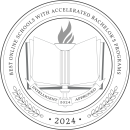Adding a degree to your resume is a great way to start or advance your career. By applying what you learn in the classroom to your daily work, you’ll grow professionally starting on day one.
Benefits of a Degree
Whether you're just starting out in your professional life or are higher up the organizational ladder, pursuing an online degree or certificate at Champlain can help you achieve the career you've always dreamed of.
Our accredited online degree and certificate programs are designed to be relevant and immediately applicable. You'll quickly gain knowledge and new skills that you can use to grow in your current role or to pursue a new position.
Increase Your Earning Potential
The higher your education level, the higher salary you stand to earn. Individuals with a high school diploma earn a median annual salary of just over $42,000. Those with undergraduate and/or graduate level degrees make significantly more; bachelor's degree holders earn an annual median salary of just under $70,000, and master's degree holders earn nearly $82,000 a year.*
Become More Employable
Your education level impacts how likely you are to have and retain a job. For those with only a high school degree the unemployment rate is 6.2%. For those with a bachelor's is 3.5% and a mere 2.6% for those with a master's degree.* Earning a degree increases your stability and employability significantly.
Find Professional Success
Champlain College Online graduates have leveraged their online education to secure jobs in top corporations, nonprofits, and governmental organizations worldwide. Select organizations where you can find Champlain graduates include:
- AT&T
- Ben & Jerry's
- Booz Allen Hamilton
- Burton Snowboards
- Cigna
- Comcast
- Dealer.com/Cox Automotive
- Deloitte
- Department of Defense
- Federal Bureau of Investigations
- Fidelity Investments
- GE Healthcare
- Internal Revenue Service
- Keurig Dr. Pepper
- ManTech
- MetLife
- People's United Bank
- U.S. State Department
- University of Vermont Health Network
*Source: Bureau of Labor Statistics (BLS), 2022; Assumes 52 weeks worked per year)












